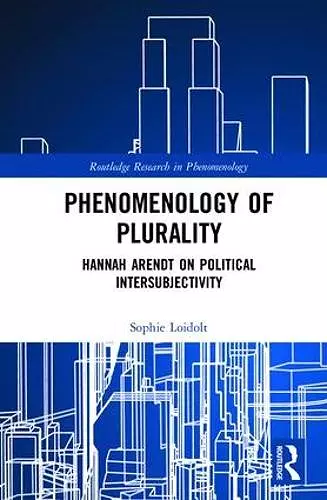Phenomenology of Plurality
Hannah Arendt on Political Intersubjectivity
Format:Hardback
Publisher:Taylor & Francis Ltd
Published:21st Sep '17
Currently unavailable, and unfortunately no date known when it will be back
This hardback is available in another edition too:
- Paperback£42.99(9780367887575)

Winner of the 2018 Edward Goodwin Ballard Book Prize awarded by the Center for Advanced Research in Phenomenology
This book develops a unique phenomenology of plurality by introducing Hannah Arendt’s work into current debates taking place in the phenomenological tradition. Loidolt offers a systematic treatment of plurality that unites the fields of phenomenology, political theory, social ontology, and Arendt studies to offer new perspectives on key concepts such as intersubjectivity, selfhood, personhood, sociality, community, and conceptions of the "we." Phenomenology of Plurality is an in-depth, phenomenological analysis of Arendt that represents a viable third way between the "modernist" and "postmodernist" camps in Arendt scholarship. It also introduces a number of political and ethical insights that can be drawn from a phenomenology of plurality. This book will appeal to scholars interested in the topics of plurality and intersubjectivity within phenomenology, existentialism, political philosophy, ethics, and feminist philosophy.
"Sophie Loidolt's book is timely and impressive . . . [It] is a great example of reconstructive critical interpretation that challenges prevailing interpretations and develops anew Arendt's phenomenological approach to political intersubjectivity . . . Loidolt's book offers one of the most original and compelling interpretations of Arendt's philosophical thinking in recent decades. Readers approaching it in a philosophical spirit will be rewarded with a rich understanding of Arendt's work as a political phenomenology that can still teach us much about the 'human condition' today." – Notre Dame Philosophical Reviews
"Sophie Loidolt’s Phenomenology of Plurality marks an innovative and timely contribution. The book not only provides a fresh understanding of Arendt’s concepts of subjectivity, intersubjectivity and a political form of the 'we,' which escape the prevalent perspectives within contemporary political theory. It also shows how Arendt’s phenomenology of plurality rethinks the main presuppositions of the phenomenological tradition itself, enriching it with a distinctly political perspective on intersubjectivity and action." – Arendt Studies
"A book analyzing Hannah Arendt’s phenomenological background thoroughly is long overdue . . . Many texts within Arendt-scholarship simply adopt Arendt’s language—often full of beautiful and meaningful expressions—without supplying a deeper analysis of its content and context. This is not the case with Sophie Loidolt’s book. She does not just ‘talk the talk’, she also delves deep into the meaning of Arendt’s language. Loidolt’s expertise in phenomenology allows her to achieve this goal, which also contributes to the achievement of her broader aim to familiarize both phenomenologists with Arendt and Arendtian scholars with foundations of phenomenology . . . Due to its comprehensiveness and the depth of Loidolt’s analysis, the book has great potential, not only to inspire a new, phenomenologically-oriented appreciation of Arendt’s work but also to become a crucial contribution to Arendt scholarship." – Phenomenological Reviews
"Loidolt’s work authoritatively reinstates Arendt as a central figure in the phenom- enological tradition . . . It is Loidolt, not Arendt, who is laying the foundation for the future work of political phenomenologists by presenting us with the novel idea of a "phenomenology of plurality". This promising idea is Loidolt’s central and most interesting contribution. It may potentially revolutionize the way phenomenology will be practiced." – Phenomenology and the Cognitive Sciences
"This impressive study is the first systematic and comprehensive reconstruction of Hannah Arendt's phenomenology ever pursued . . . Loidolt's readings of Arendt (and other phenomenologists) are rigorous and of unsurpassed analytic depth . . . After reading this book, nobody should doubt any longer that Arendt's work and method belong to phenomenology, and, what’s more, how she enriched it with a political vocabulary and a method that fits actualized plurality." – Hypatia
"Loidolt succeeds in providing an introduction to Arendt for phenomenologists and an intro- duction to phenomenology for Arendt scholars, and in making explicit many ideas implicit in her work. Most importantly, by showing the oscillations in Arendt’s thought, in pointing out certain arguments as unsound and reformulating certain aspects of her theory, Loidolt opens the door for further work in political phenomenology." – Philosophy in Review
ISBN: 9781138631892
Dimensions: unknown
Weight: 520g
290 pages